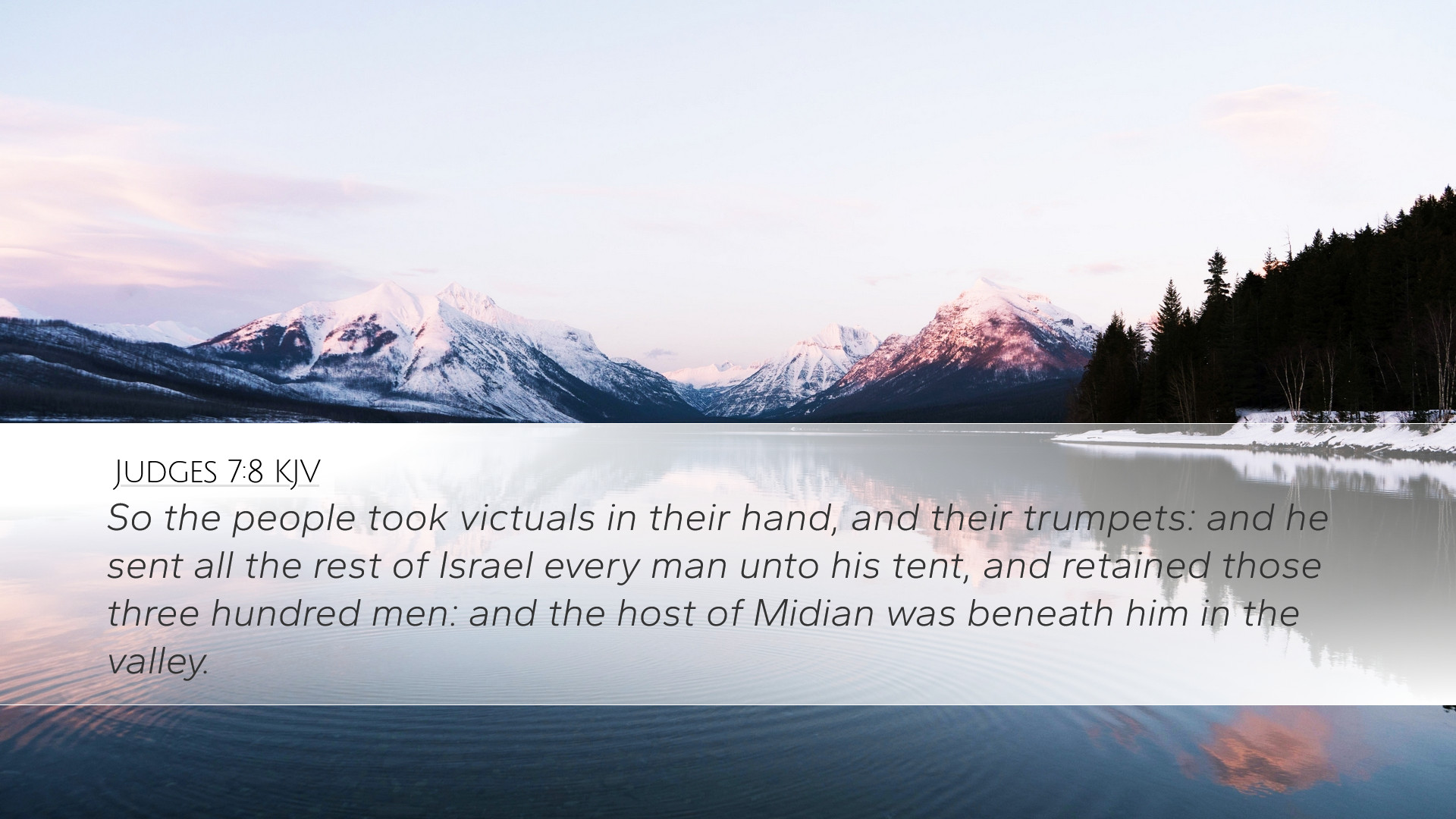Old Testament
Genesis Exodus Leviticus Numbers Deuteronomy Joshua Judges Ruth 1 Samuel 2 Samuel 1 Kings 2 Kings 1 Chronicles 2 Chronicles Ezra Nehemiah Esther Job Psalms Proverbs Ecclesiastes Song of Solomon Isaiah Jeremiah Lamentations Ezekiel Daniel Hosea Joel Amos Obadiah Jonah Micah Nahum Habakkuk Zephaniah Haggai Zechariah MalachiJudges 7:8
Judges 7:8 KJV
So the people took victuals in their hand, and their trumpets: and he sent all the rest of Israel every man unto his tent, and retained those three hundred men: and the host of Midian was beneath him in the valley.
Judges 7:8 Bible Commentary
Commentary on Judges 7:8
Introduction
Judges 7:8 presents a pivotal moment in the narrative of Gideon’s leadership during Israel's conflict with the Midianites. This verse encapsulates crucial themes such as divine selection, the power of faith, and the dynamics of leadership. The insights gathered from notable public domain commentaries provide a comprehensive understanding of this significant text.
Verse Analysis
Text of Judges 7:8 (KJV): "So the people took victuals in their hand, and their trumpets: and he sent all the rest of Israel every man unto his tent, and retained those three hundred men: and the host of Midian was beneath him in the valley."
Contextual Overview
In the broader narrative of the Book of Judges, the Israelites are suffering under Midianite oppression, which has driven them to desperation. God raises Gideon to deliver Israel, starting a process marked by a series of divinely orchestrated tests to reduce Gideon’s army to a manageable number, thereby demonstrating God's power in the eventual victory.
Commentary Insights
1. The Significance of Numbers
Matthew Henry's Commentary: Henry emphasizes the importance of the reduction from 32,000 to 300 men as a demonstration of God’s power. The diminishing numbers underline the principle that victory is not achieved by human strength but through divine intervention. Henry observes that God seeks to eliminate any chance of human boasting by showcasing His ability to deliver through a small group.
2. The Role of Preparation
Albert Barnes’ Notes: Barnes highlights that the “victuals” (provisions) and “trumpets” the Israelites take with them signify readiness and proclamation, respectively. The trumpets serve as instruments of divine announcement and spiritual warfare. This preparation indicates that even in a divinely orchestrated victory, human readiness plays a role. Barnes notes that God honors preparation, as evidenced in other parts of Scripture.
3. Leadership Dynamics
Adam Clarke's Commentary: Clarke reflects on Gideon's leadership style, contrasting it with traditional warrior conduct. He points out that Gideon’s decision to keep only 300 men showcases trust in Yahweh’s promise rather than reliance on overwhelming force. Clarke argues that effective leadership involves discerning when to act with the numbers one has, emphasizing faith over statistics.
4. Theological Implications
Faith as a Central Theme: All three commentators converge on the theme of faith. The small number of men selected by Gideon exemplifies how God often chooses what is weak and insignificant in the eyes of the world to confound the mighty (1 Corinthians 1:26-31). This reinforces the Biblical notion that reliance on God rather than human strength leads to divine victories.
5. The Nature of God’s Deliverance
Divine Sovereignty: The passage illustrates God’s sovereign control over Israel's circumstances and the Midianite threat. As noted by Henry, God intentionally directed Gideon to reduce his army to ensure that the coming victory would be attributed solely to divine intervention.
6. Practical Applications for Today
In the contemporary context, the lessons from Gideon's story can be paralleled in church leadership and personal faith journeys. Leaders are often faced with overwhelming challenges that may seem insurmountable. The assurance that God works through the faithful, regardless of perceived limitations, remains a critical lesson. Each commentary reflects the understanding that God uses ordinary circumstances to manifest His extraordinary grace.
Conclusion
Judges 7:8 serves as a reminder of God’s power and faithfulness in delivering His people. The insightful observations from Matthew Henry, Albert Barnes, and Adam Clarke provide multifaceted perspectives that enrich our understanding of biblical leadership and divine intervention. This verse continues to encourage pastors, students, and scholars to look beyond human limitations and trust in the omnipotence and sovereignty of God.


